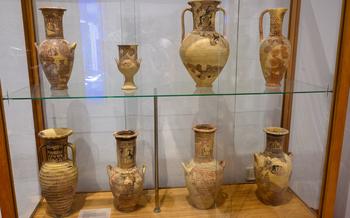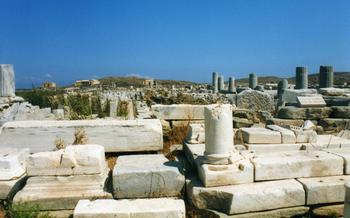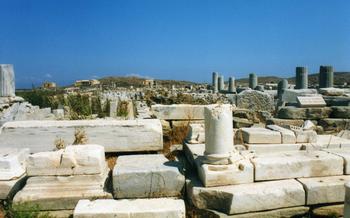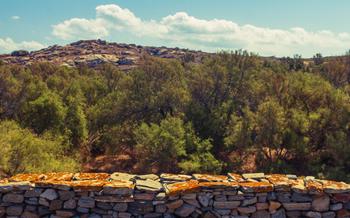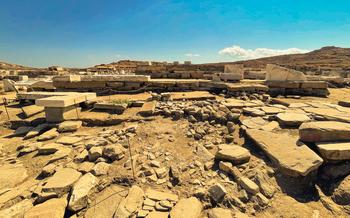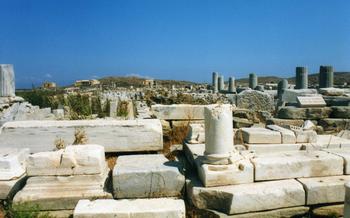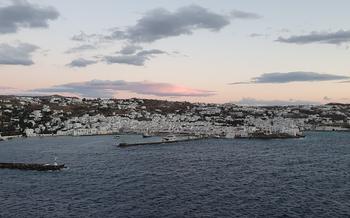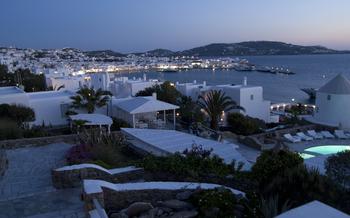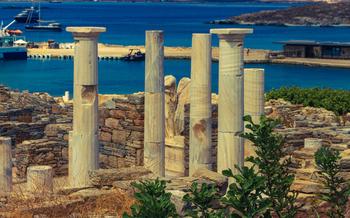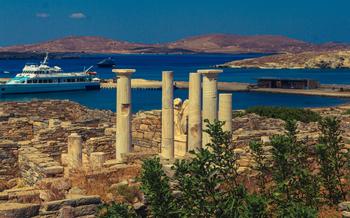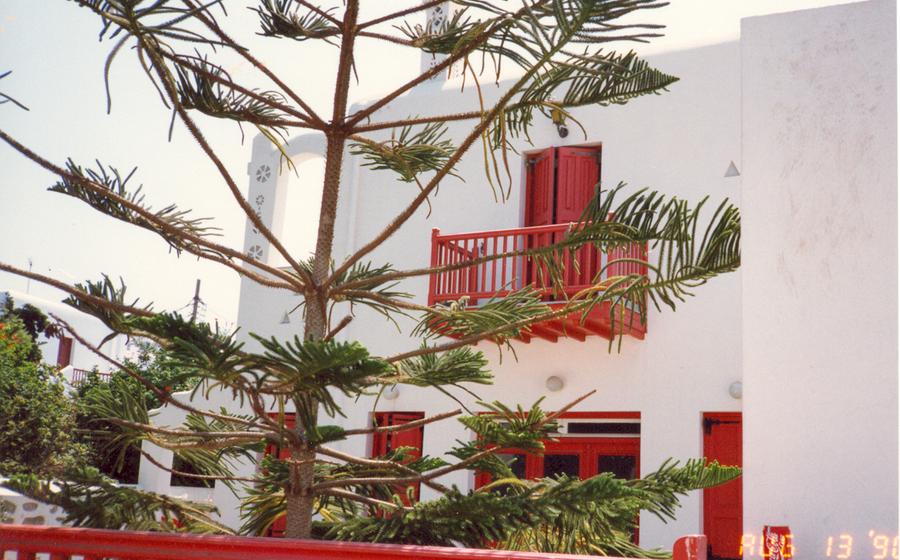
Cave of Hercules at Delos
- The Cave of Hercules
- Delos Island
- Getting to Delos
- Exploring the Cave
- Hercules' Connection
- Other Attractions on Delos
- Photography and Videography
- Delos Island's Rich History
- Mythology and Legends
- Archaeological Discoveries
- Local Cuisine
- Beaches of Mykonos
- Nightlife and Entertainment
- Tips for First-Time Visitors
The Cave of Hercules
In the heart of Delos, an island steeped in myth and history, lies the enigmatic Cave of Hercules. This natural wonder, shrouded in ancient lore, has captivated the imaginations of travelers and historians alike. According to Greek mythology, the mighty hero Hercules, son of Zeus, sought refuge within these sacred chambers after completing one of his twelve legendary labors. The cave holds a significant place in Greek mythology, serving as a sanctuary for the revered hero and a testament to his extraordinary feats of strength and courage.
Archaeological excavations have revealed artifacts and inscriptions that further enhance the cave's historical significance. These discoveries provide glimpses into the ancient rituals and ceremonies that took place within its depths, shedding light on the religious and spiritual practices of the ancient Greeks. The cave's well-preserved state and the surrounding ruins offer a tangible connection to the rich history of this sacred site.
Today, visitors can embark on a journey to explore the Cave of Hercules, following in the footsteps of the legendary hero. The cave's accessibility and well-marked paths make it an ideal destination for adventurers of all levels. Its proximity to the port and its inclusion in guided tours of Delos ensure an easy and convenient visit. Whether seeking a unique historical experience or a connection to ancient mythology, the Cave of Hercules beckons travelers to delve into its depths and discover its hidden treasures.
Delos Island
Delos, a small, uninhabited island in the Aegean Sea, is located just a short distance from the cosmopolitan island of Mykonos. Despite its diminutive size, Delos boasts an immense historical and cultural significance that belies its physical dimensions. In antiquity, this sacred island was revered as the birthplace of the Greek gods Apollo and Artemis, and served as a prominent pilgrimage site and sanctuary. Its profound religious importance is reflected in the numerous temples, altars, and sanctuaries that once adorned its shores, drawing worshippers and pilgrims from far and wide.
In recognition of its exceptional cultural heritage, Delos was designated a UNESCO World Heritage Site in 1990, further cementing its status as a treasure trove of ancient Greek history and civilization. The island's ruins and artifacts offer a glimpse into the grandeur and opulence of a bygone era, providing valuable insights into the religious, political, and economic life of ancient Greece. Delos stands as a testament to the enduring legacy of ancient Greek culture and its profound influence on Western civilization.
While Delos is currently uninhabited, visitors can easily access the island from Mykonos via a short ferry ride. The island offers limited accommodation and dining options, inviting visitors to immerse themselves fully in its historical and archaeological wonders. Whether you're a history buff, a mythology enthusiast, or simply seeking a unique and awe-inspiring destination, Delos promises an unforgettable journey through the annals of ancient Greece.
Getting to Delos
To reach the captivating island of Delos from the lively shores of Mykonos, you have a range of transportation options at your disposal. Ferries and boats offer a convenient and scenic journey across the sparkling Aegean Sea. These vessels depart regularly from Mykonos Town, the main port of the island. The trip typically takes around 30-45 minutes, providing ample time to soak in the breathtaking views of the surrounding islands and the vast expanse of the sea.
Advance booking is highly recommended during the peak tourist season to avoid any disappointment or long queues. Ferry tickets can be purchased online or directly from the port. Prices vary depending on the time of year and the specific ferry company.
For those seeking a more personalized experience, private boat rentals are available. This option offers greater flexibility in terms of departure times and allows you to tailor your journey to suit your preferences. Whether you prefer a leisurely cruise or a speedy transfer, there are various boat rental companies in Mykonos that can cater to your needs.
Upon arrival in Delos, you will be greeted by the tranquil atmosphere of the island, a stark contrast to the vibrant energy of Mykonos. The ancient ruins and historical landmarks await your exploration, promising a journey through time and mythology.
Exploring the Cave
Navigating the Cave of Hercules requires caution and appropriate footwear due to the uneven terrain and slippery surfaces. Visitors should be aware of their surroundings and watch their footing to avoid any accidents. It is advisable to bring a flashlight or headlamp for exploring the darker corners of the cave. While the cave is generally safe for exploration, there are certain areas that are off-limits to visitors for safety reasons. These areas may be marked with signs or barriers, and it is crucial to respect these restrictions.
Hercules' Connection
Ancient legends and myths firmly intertwine the Cave of Hercules with the legendary hero Hercules, also known as Heracles. In Greek mythology, Hercules was renowned for his extraordinary strength and his numerous heroic feats. According to one legend, Hercules was shipwrecked on the island of Delos and sought refuge in the cave. Here, he is said to have slain a monstrous serpent or dragon, a formidable creature that terrorized the island. This heroic act earned Hercules the gratitude and admiration of the Delians, who revered him as a protector and savior.
Hercules' association with the cave extends beyond this legendary encounter. The cave itself holds symbolic significance in Hercules' mythical journey. It is believed that the cave represents a transitional space, a place where Hercules underwent a transformation and emerged as a stronger and more courageous hero. The cave's dark and mysterious depths may have served as a metaphor for Hercules' inner struggles and his ultimate triumph over adversity.
While there is no definitive archaeological evidence directly linking Hercules to the cave, the site's historical and mythological significance cannot be denied. The Cave of Hercules remains a powerful symbol of the hero's enduring legacy and his profound influence on Greek mythology and culture. Visitors to the cave can't help but feel a sense of awe and wonder as they explore the depths of this ancient sanctuary, where myth and history intertwine in a captivating tale of heroism and adventure.
Other Attractions on Delos
Aside from the Cave of Hercules, Delos offers a wealth of historical and cultural attractions that provide a glimpse into ancient Greece. Explore the Sanctuary of Apollo, a vast complex dedicated to the sun god, featuring sacred temples, altars, and stoas. The House of Dionysus showcases intricate mosaics depicting scenes from Greek mythology. Don't miss the Terrace of the Lions, a row of majestic marble lions that once guarded the sacred lake. For an in-depth understanding of the island's significance, visit the Delos Museum, which houses a collection of artifacts and exhibits chronicling Delos' rich history.
When planning your itinerary, consider the following suggestions:
-
Half-Day Exploration: Start with the Cave of Hercules, then visit the Sanctuary of Apollo and the House of Dionysus. Conclude your tour at the Delos Museum to gain a deeper understanding of the island's history and significance.
-
Full-Day Excursion: Begin with the Cave of Hercules, followed by a visit to the Terrace of the Lions and the Sanctuary of Apollo. After lunch, explore the House of Dionysus and other significant ruins, such as the Agora and the Theater. Conclude your day at the Delos Museum for a comprehensive overview of the island's history and culture.
-
Multi-Day Exploration: If you have more time, consider a multi-day trip to Delos to delve deeper into its rich history and cultural heritage. Stay overnight on the island to experience its unique atmosphere and tranquility under the starry night sky. This will allow you to explore the island at a leisurely pace, visit lesser-known sites, and immerse yourself in its ancient wonders.
Photography and Videography
Capturing the essence of the Cave of Hercules through photography and videography requires a combination of technical expertise and artistic vision. To create stunning images, utilize natural light and shadows to your advantage. The interplay of light and darkness within the cave can produce dramatic and atmospheric shots. Experiment with different angles and perspectives to showcase the cave's unique formations and features. A tripod is highly recommended for stability and to avoid blurry images. Consider bringing additional lighting equipment if you wish to illuminate specific areas or create specific effects.
Be mindful of any photography restrictions or permit requirements on Delos. Respect the fragile nature of the site and avoid disturbing any artifacts or formations. By adhering to these guidelines, you can not only capture beautiful memories of your visit but also contribute to the preservation of this ancient wonder.
Delos Island's Rich History
Delos' past is a tapestry woven with the threads of ancient civilizations and sacred rituals. In the heart of the Cyclades, this island emerged as a revered sanctuary in the Bronze Age, attracting pilgrims from far and wide to honor Apollo and Artemis. Its sacred status imbued it with a profound sense of holiness, making it a place of worship and reverence throughout the ancient world.
As a sanctuary, Delos served as a neutral ground, where rival city-states could set aside their differences and come together in peace. This sacred truce ensured that the island remained untouched by war and bloodshed, further solidifying its status as a place of refuge and tranquility.
Delos' strategic location at the crossroads of the Aegean Sea propelled it into a thriving commercial hub. Merchants from across the Mediterranean flocked to the island, drawn by its reputation for safety and its bustling marketplace. The island's harbor teemed with ships laden with goods from distant lands, transforming it into a vibrant hub of trade and commerce.
In the 2nd century BC, Delos reached the zenith of its power and influence. The island's wealth and prosperity were evident in its magnificent temples, theaters, and public buildings. The Delian League, a maritime alliance led by Athens, made Delos its treasury, further cementing its status as a financial powerhouse in the ancient world.
Yet, Delos' glory was not destined to last. As the Roman Empire rose to prominence, the island's fortunes waned. Its commercial importance diminished, and its sacred status gradually faded into obscurity. By the Middle Ages, Delos had been abandoned, its once-magnificent structures reduced to ruins.
Today, Delos stands as a testament to the passage of time and the rise and fall of civilizations. Its archaeological remains offer a glimpse into a bygone era, when the island was a sacred sanctuary, a bustling trading hub, and a beacon of prosperity in the ancient world.
Mythology and Legends
Delos holds a significant place in Greek mythology, deeply entwined with the gods Apollo and Artemis. According to legend, the island was once a floating rock that wandered aimlessly through the Aegean Sea. When Leto, the mother of Apollo and Artemis, was pursued by the wrathful goddess Hera, she sought refuge on Delos. The island, moved by her plight, became stationary, providing a safe haven for Leto to give birth to her divine twins.
Apollo and Artemis became the protectors and patrons of Delos, making it a sacred sanctuary. The island was believed to be the birthplace of light, music, and prophecy. Apollo's oracle at Delos was renowned throughout the ancient world, attracting pilgrims and supplicants seeking divine guidance.
Myths and legends surrounding Delos are deeply intertwined with the divine and the supernatural. The island was said to be a gathering place for the gods, who would assemble in its sacred groves to feast and celebrate. The presence of these deities imbued Delos with an aura of mystery and reverence.
These mythological associations have left an indelible mark on the island's history and culture. Delos remains a place of pilgrimage and fascination, attracting visitors who come to experience the magic and wonder of its ancient legends.
Archaeological Discoveries
Delos has been a treasure trove for archaeologists, yielding a wealth of artifacts and ruins that shed light on the island's rich history and culture. Systematic excavations began in the late 19th century and have continued to this day, uncovering a vast array of remains from different periods.
Among the most significant discoveries are the remains of the Temple of Apollo, which was one of the most important religious sanctuaries in ancient Greece. The temple was built in the 6th century BC and was adorned with exquisite sculptures and offerings. Other notable finds include the Theater of Delos, which could accommodate up to 5,500 spectators, and the Agora of the Italians, a bustling marketplace where merchants from across the Mediterranean traded their goods.
The artifacts unearthed at Delos provide valuable insights into the daily life and culture of the ancient Delians. These include pottery, tools, jewelry, and religious objects, which offer a glimpse into the island's economy, craftsmanship, and religious practices.
Ongoing research and conservation efforts are being carried out to further explore and preserve Delos' archaeological heritage. The island's unique collection of ruins and artifacts continues to captivate scholars and visitors alike, providing a tangible connection to the vibrant civilization that once flourished on this sacred island.
Local Cuisine
When it comes to gastronomy, Mykonos is no less enchanting than in its natural beauty and history. The island's culinary traditions are deeply rooted in Greek cuisine, featuring fresh seafood, local produce, and aromatic herbs. Indulge in classic dishes such as moussaka, a succulent eggplant and potato casserole, or stifado, a hearty beef stew simmered in a rich tomato sauce. Don't miss the opportunity to savor the freshest catches of the day, grilled to perfection and served with a drizzle of olive oil and lemon. For a truly authentic experience, venture into the charming tavernas tucked away in the narrow streets of Mykonos Town. Here, you'll find family-run establishments serving up traditional recipes that have been passed down for generations. And to satisfy your sweet tooth, don't forget to try the loukoumades, delicious honey-drizzled doughnuts that are a local favorite.
Beaches of Mykonos
Mykonos is renowned for its stunning beaches, each offering a unique experience to visitors. The island's southern coast is dotted with some of the most famous beaches, including Paradise Beach, Super Paradise Beach, and Elia Beach. These beaches are known for their crystal-clear waters, soft golden sands, and lively atmosphere, with beach clubs, bars, and restaurants lining the shores.
For those seeking a more secluded and tranquil experience, there are several hidden gems to discover on the island's north coast. Beaches like Agios Sostis, Panormos, and Fokos offer a serene escape, with fewer crowds and pristine landscapes. These beaches are ideal for swimming, sunbathing, and enjoying the tranquility of the Aegean Sea.
Mykonos also offers a variety of water sports and activities for adrenaline enthusiasts. Paradise Beach and Super Paradise Beach are popular spots for windsurfing, kitesurfing, and jet-skiing, with rental shops and instructors available. Elia Beach, with its long stretch of sandy beach, is perfect for beach volleyball, paddleboarding, and kayaking.
For those seeking a luxurious beach experience, several beach clubs on the island offer plush sunbeds, gourmet dining, and exclusive services. These beach clubs, such as Nammos and Scorpios, provide a sophisticated ambiance and a chance to mingle with celebrities and jet-setters.
Nightlife and Entertainment
Mykonos is renowned for its vibrant nightlife, attracting party-goers and revelers from around the world. The island comes alive after sunset, with a diverse selection of bars, clubs, and beach parties catering to different tastes and preferences.
For those seeking a lively atmosphere, head to the town of Mykonos, where the streets are lined with bars and clubs playing a mix of electronic dance music, Greek tunes, and international hits. Popular venues include Jackie O', Remezzo, and Astra, known for their energetic crowds and renowned DJs.
If you prefer a more laid-back ambiance, venture to the island's southern coast, where you'll find beach bars and lounge clubs offering stunning sunset views and chill-out vibes. Paradise Beach and Super Paradise Beach are particularly popular for their beach parties, featuring live music, cocktails, and dancing under the stars.
For a truly unique experience, take a boat trip to the nearby island of Delos, where you can enjoy a sunset dinner party or a night swim in the crystal-clear waters.
Remember to dress appropriately for the occasion, as some venues have dress codes. Also, be prepared for high prices, especially at the more exclusive clubs and beach bars.
Tips for First-Time Visitors
As a first-time visitor to Delos, here are some essential tips to make your trip more enjoyable and enriching:
- Plan Your Visit: Delos is a small island, but its rich history and numerous attractions require careful planning. Allocate enough time to explore the island thoroughly, including the Cave of Hercules.
- Comfortable Shoes: The terrain on Delos can be uneven and rocky, so wear comfortable walking shoes to navigate the island's paths and trails safely.
- Sun Protection: Delos receives ample sunshine, so protect yourself from the sun's harmful rays by wearing sunscreen, sunglasses, and a hat.
- Water and Snacks: Bring plenty of water and snacks, as there are limited food and beverage options available on the island.
- Camera and Tripod: Don't forget your camera to capture the island's stunning scenery and unique landmarks. A tripod can be useful for stable shots, especially in low-light conditions.
- Respectful Behavior: Remember that Delos is a sacred site with historical and archaeological significance. Be respectful of the island's cultural heritage and refrain from touching or damaging any artifacts or ruins.
- Guided Tours: Consider joining a guided tour to gain in-depth insights into Delos' history, mythology, and archaeological discoveries. Tours often provide additional context and information that enhance the visitor experience.
